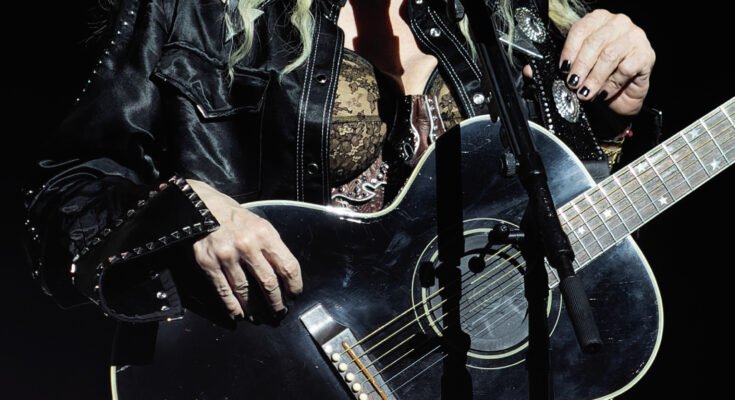In the ever-evolving world of pop music, one name remains consistently etched into its foundation: Madonna. More than just the “Queen of Pop,” Madonna is a cultural force, a revolutionary, and, most importantly, a trailblazer. The phrase “Madonna had to run so that today’s pop artists could walk” isn’t just poetic hyperbole — it’s a truth grounded in decades of musical evolution, bold experimentation, and social defiance. Her influence is embedded in the DNA of modern pop music and in the personas of today’s biggest female stars. Without Madonna, the landscape of pop — and the freedom it grants its artists — would look drastically different.
Breaking the Mold in the ’80s
When Madonna burst onto the scene in the early 1980s, the music industry was largely male-dominated, and female artists were often confined to rigid roles and expectations. Madonna defied that from the start. With her debut self-titled album in 1983, she introduced herself as a playful, provocative, and self-assured pop star — an image that quickly evolved into something much larger.
She wasn’t just singing catchy dance tracks; she was constructing an identity, owning her sexuality, and using her body and voice as instruments of power and protest. In a time when good girls were rewarded and rebels were punished, Madonna didn’t just rebel — she redefined what a female pop star could be.
Reinvention as a Career Strategy
What separates Madonna from many of her contemporaries, and from countless artists who have come since, is her unmatched ability to reinvent herself — both sonically and visually. From the Like a Virgin era’s wedding-dress shock value to the spiritual and electronic vibes of Ray of Light, Madonna has constantly evolved with, and often ahead of, the times.
This pattern of reinvention isn’t just a hallmark of her career; it’s a blueprint followed by today’s pop divas. Think of Lady Gaga’s theatrical personas, Taylor Swift’s genre-hopping discography, Beyoncé’s visual storytelling and activism, or Dua Lipa’s retro-futuristic aesthetic — all of these artists owe a debt to Madonna’s fearlessness in evolving and risking everything to pursue authenticity and artistry.
Madonna’s Boldness Paved the Way for Expression
Madonna pushed boundaries in every direction — religious, political, sexual, and racial. Her 1989 video for “Like a Prayer” ignited controversy for its depiction of religious iconography and interracial relationships, costing her a Pepsi endorsement but sparking a national conversation about censorship, art, and religion.
Today’s pop stars benefit from the battles Madonna fought. When Lil Nas X kissed a male dancer on live TV or when Billie Eilish publicly challenged beauty standards, they were walking through doors Madonna had already kicked down. Her willingness to challenge taboos gave future artists a wider canvas on which to express themselves.
The Businesswoman Behind the Persona
Madonna also pioneered the idea of the pop star as a business mogul. Long before the term “brand” was synonymous with musicians, she was building an empire — launching fashion lines, starring in films, writing children’s books, and creating a billion-dollar touring legacy. Today’s artists, from Rihanna’s Fenty empire to Beyoncé’s Ivy Park and music streaming deals, emulate that same entrepreneurial spirit Madonna championed decades ago.
She made it okay — even expected — for pop stars to be savvy businesswomen, to control their narratives, and to monetize their identities without apology.
The Madonna DNA in Modern Pop
You don’t have to squint to see Madonna’s influence in today’s chart-toppers:
- Lady Gaga: Frequently cited as a “new Madonna,” Gaga’s boundary-pushing visuals, advocacy for LGBTQ+ rights, and love of theatricality are clear echoes of Madonna’s playbook.
- Beyoncé: While she has carved her own legendary path, Beyoncé’s commitment to control over her music, message, and visual narrative owes something to Madonna’s example.
- Taylor Swift: Swift’s ability to shift genres while maintaining artistic control — from country roots to synth-pop to indie folk — mirrors Madonna’s genre-bending career trajectory.
- Miley Cyrus: Her transformation from Disney star to unapologetic rebel mimics Madonna’s own subversive metamorphoses.
- Ariana Grande, Katy Perry, and Charli XCX: From their fashion to their sound, these artists draw heavily from Madonna’s unapologetic femininity, her synthesis of pop with electronic and dance, and her visual experimentation.
Madonna and the Fight for LGBTQ+ Rights
No article about Madonna’s impact would be complete without acknowledging her role as an LGBTQ+ ally. At a time when AIDS was ravaging communities and mainstream artists were afraid to speak out, Madonna used her platform to educate, raise awareness, and advocate. Her 1991 documentary Truth or Dare was groundbreaking for its inclusion of her gay backup dancers and its unapologetic portrayal of queer culture.
That advocacy wasn’t performative — it was personal, risky, and deeply influential. Today’s pop divas are often embraced by the LGBTQ+ community, but Madonna was one of the first mainstream artists to earn that embrace by standing with the community when it wasn’t easy or popular.
Enduring Legacy
Madonna’s importance isn’t just historical — it’s ongoing. She continues to release new music, tour globally, and speak out on issues that matter. Her recent Celebration Tour reminded fans and critics alike of her unmatched contribution to pop culture.
She doesn’t need to be at the top of the charts to be relevant. Her legacy is living and breathing in every new pop anthem, every reinvention, and every artist who dares to take control of her voice, body, and career.
Conclusion: Madonna as the Blueprint
“Madonna had to run so that today’s pop artists could walk” isn’t just a tribute — it’s a recognition of cultural lineage. She ran — often against the wind, under fire, and ahead of her time. She stumbled, got back up, and kept pushing boundaries. And in doing so, she carved out a space for the next generation of women in pop to create more freely, express more boldly, and thrive more powerfully.
She is not just a pop star — she is the standard by which pop stars are measured. And for that, Madonna remains not just important, but essential.



